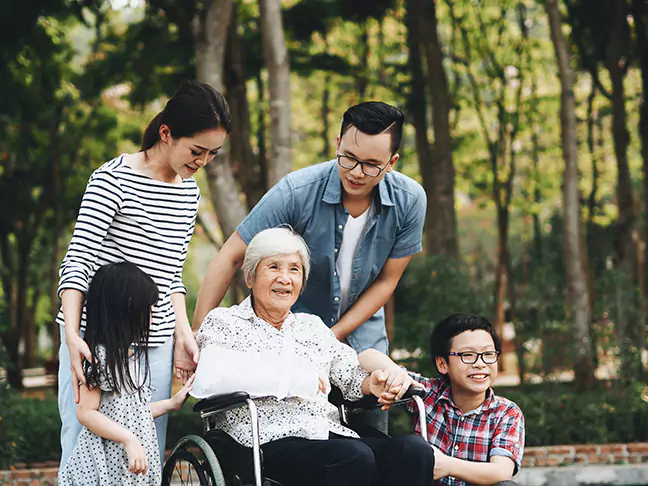Many people find themselves taking care of elderly parents. You may have to visit their home often to help with tasks around the house. Other times, their needs are much more significant, and you move them in with you. Aging parents is a normal part of life, but knowing how to care for them and continue to meet your own needs is very difficult for many people. There are some resources and strategies available that may help adult children do their best to ensure their parents get the care and support they need.
How Do You Know When to Step in to Help Aging Parents?
One of the first challenges adult children face is knowing when to actually take steps to help their parents. Often, it starts with needing a bit of help with things like gutting the grass, doing yard work, or cleaning difficult to reach areas. Then, their needs may expand. At what point do you need to step in and do more for them?
Not all parents are going to be open about their needs, either. Some people are very independent, and having to ask for help is perhaps one of the hardest things they have to do. They may not do so at all.
Some signs your loved one may need additional support include the following:
- It is not about a parent’s age but rather about their new limitations. If there is a sudden health emergency, that is typically going to warrant getting immediate help.
- A new health issue that’s been diagnosed may also be an indication that an elderly person needs more support.
- They may have a graduate decline in overall health. You may notice they are not moving as much or engaging in activities they used to do.
- You notice things not being done around the home, such as cleaning or personal care. They may not be paying bills, or their personal hygiene is suffering because they don’t feel comfortable taking a shower.
- Memory loss is becoming more common for your loved one. Providing care because they are missing important events or forgetting what you tell them are also signs they may need help.
Should You Become a Caregiver?
Your parent’s life is not your own. For many people, making the decision to be a full-time caregiver for a parent is downright hard to do. You may want to be there for them. You may want to ensure they get the very best attention to their needs, but you have your own career, family, and obligations. What do you do?
Before going further, take a closer look at the caregiving responsibilities your parent needs. Be realistic about what their needs are right now and what they are likely to be in the coming months and years.
Are they able to manage most of their needs on their own? If personal care, like being able to use the restroom, bathe, prepare meals, and maneuver through the home, is still okay, providing care a few times a week to help with tasks may be enough. If they need far more support, determine if that is something you can logically do on your own.
- Do they need someone with them constantly to ensure they are safe?
- Does your parent need support for just some tasks? Which ones and who can provide that help?
- How is their mental health? Cognitive decline and memory loss can, unfortunately, advance quickly, and caring for elderly parents with dementia or other conditions like it may require full-time care.
- What are your living arrangements and theirs? Is there room for someone in the family to live with them to provide extra help?
- Is your parent’s home safe, or is it in a state of disrepair that may require significant upgrades and cleaning to make it safe?
- What amount of time do you have to give them? If you work a full-time job outside the home, providing care during the day could be difficult.
It is wise to have a frank conversation with them and their doctor as well. Elderly parents at home on their own become a safety risk when there are:
- Serious health issues
- Significant mental health decline
- Personal hygiene and day-to-day care needs
After really examining where your parents stand right now, it is time to make some decisions about what you can do moving forward.

Find the Resources to Help You
Many adult children have to go through the process of providing some level of support to their aging parents. For that reason, there are often numerous resources available to help. It’s a good idea to pursue these resources now before you make any decisions about how to provide care to your parents as they get older.
Administration on Aging
This is a government agency available throughout the country that offers various programs and services to seniors and caregivers. There is help in selecting health insurance available. There are also counselors that can help with long term care planning as well as legal assistance, as caregivers may need to take steps to become a Power of Attorney for their older parent.
Benefits.gov
Utilize this website to help you learn about available benefits for your parents. Here, you will gain insight into both federal and state programs and most local programs across numerous agencies. This is an excellent tool to help you find available resources to cover some or all of the costs associated with caregiving for seniors. There’s a tool on the site called the Benefit Finder that makes it super easy to find things like healthcare and medical assistance, disaster relief, and financial assistance.
National Association of Area Agencies on Aging
Use this government website to help you find help with eldercare. You can learn about specific programs located within your area, including aging-related support programs designed to help facilitate the changes adult children must navigate for their parents.
Department of Veterans Affairs
If your parent was a veteran, they may have benefits and support resources available to them through the Department of Veterans Affairs. The organization actually offers a caregiver support tool on its site that can help adult children to help their aging parents navigate their financial and healthcare support options. This includes finding a caregiver support coordinator who can work closely with you. You can also call 855-260-3274 to learn more about the options available to your parent.
Medicare and Medicaid
Though your loved one may have these programs in place, they may not be using all of the services available through them – and that could mean missing key financial opportunities to reduce their costs. Medicaid may be available for seniors who have a very low income. Medicare is available to those over the age of 65 who meet other requirements. Keep in mind that both programs offer limited support.
If your parent has a supplemental health insurance plan instead of Original Medicare, that could mean they have additional support and health benefits. Contact that organization directly to find out what those options may be.
In addition to these resources, consider the following:
- Contact any health insurance program they have to inquire about available coverage, programs, and services for caregiving, long-term care needs, and in-home supportive services.
- Turn to your city to find out if they offer tasks like senior care programs for cutting the grass, shoveling snow, and managing trash.
- State governments have their own set of programs and resources. Google your state’s name along with “elderly caregiver resources” to find some options in your area.
Don’t be afraid to start the conversation with family, friends, neighbors, and other providers. You need to find out what options are available to you locally to help your family member.
Finally, be sure to look for caregiver support groups. You can find these locally, through your religious organization, as well as on social media sites like Facebook. The key here is to network so that both you and your loved one get the care needed. Support groups are a wealth of information, too, about care services.
Tips and Strategies for Creating a Care Plan as Adult Children Caregivers
Adult children caring for their elderly parents can happen in various ways. Only you know what is best for your specific needs. Here are some of the best ways you can start taking care of elderly parents.
Meet With Their Doctor
If you have an elderly parent, you need to be there for their doctor’s appointments if they allow you to be. Don’t try to muscle your way in, but instead encourage them to include you so that you can stay aware of their needs. This is a good way to ensure you know what’s really happening. If your adult parent allows it, and it often depends on the parent’s age and health condition, consider those medical appointments carefully.
Talk to your parent’s doctor about the following:
- Any areas of care and support they know your parent needs
- Medical care for specific health conditions or injuries
- Risks they face based on medical screenings
- Their need for help with the activities of daily living
- Tests and screenings they may need to have
- Any concerns about emotional support your parent has
- Any concerns about cognitive support your parent has
You don’t need to question the doctor about every detail. Just being there for those appointments and interacting with the doctor so you know what medications they take, what tests they have, and how to handle any complications to health is enough.
Keep in mind that the doctor may need written permission that allows them to share medical information and medical care plans with you. Be sure to get this in early while your loved one is still fully cognizant and can make the decision to allow you to act as their care provider.

Take a Look at Their Home Closely
For those who are aging but still completely capable of caring for their home, there are some things you can do throughout the home that can provide your loved ones with support and prevention of risk. Here are some ideas to help you get started.
- Make the home less dangerous. Fall risks are the biggest concern. Remove carpeting that they could trip on. Ensure pathways are clean and nothing is on the stairs.
- Install grab bars in the home, including along any steps, in the bathroom by the shower and toilet, and even by the bedside. Prevent falls that could lead to long-term hospitalization.
- Consider the investment in a home medical alert solution, like a device they can wear to call for help as well as remote monitoring tools. If nothing else, be sure they always carry their cell phone on them.
The more you do to create a safe environment for your loved ones, the less risk there is for scary situations like them falling and not getting help or someone trying to break into the home. Smart technology can help you with many of these tools.
Financial Support
Yet another area where family members often need help is with managing their finances. It is very common for seniors to struggle with problem solving, paying bills, and spending wisely. This is especially true when the parent is newly single, such as after the death of their spouse. Adult children caregivers need to have an open conversation with their loved ones, then, about the type and level of support their family member needs in this area.
When possible, use government resources or a local attorney to put in place a Power of Attorney. This legal document allows you to act on behalf of your aging parent. They must agree to this in person. This can be very valuable over time as health declines and decision making becomes hard.
Just remember. Your goal as the POA is to follow the instructions and desires of your parent, not to make decisions based on what you or other family members want to see happen. An adult child has to act on behalf of their family member.
Living Arrangement Decisions
One of the toughest decisions that adult children caregivers have to make relates to where their aging parents will live. When possible many people want to stay in their homes, but that’s not always an option.
Can They Live Alone?
In some situations, caring for aging parents that do not want to move is necessary. If that is the case, consider the following and work with other family members and perhaps professional geriatric care managers to help you create a plan as their adult child.
Family member support
Can family members come by on a routine basis to provide the support the aging parent needs? You may be able to create a schedule and work with other family members about the steps that you can all take together to support caring for aging parents while they live at home. For example, you can split up tasks around the home and days of the week that you visit among several people.
Moving in
Another option that could keep care related expenses low is to have family caregivers move into the home. This option is possible when there is a person that is capable and willing to do so, and that’s not always easy to find. As adult children caregivers, you can’t realistically leave your family behind to move in, but there could be a cousin, grandchild, or someone else that may wish to do so.
In home caregivers
Another option for caring for aging parents is to get in home caregivers. There is a lot of flexibility here in that you can choose the type of caregiving services elderly parents need and not have to pay for more care than is necessary. A local area agency can meet with you to discuss the unique needs of your elder parent and their wishes. Then, you can discuss the following:
- The frequency of having in home caregivers at the home
- The types of caregiving services provided
- Who will provide the help (what is their skill and experience?)
- Can they provide personal care needs?
- Can they provide caregiving support for maintaining the home, providing transportation to medical appointments, and emotional support?
- As parents age, can the caregivers offer more services if they are needed, for example, if health declines?
When speaking to in home caregivers, be sure to understand the level of service and the cost. Care related expenses for these services range widely. Some health insurance, Medicare, and Medicaid programs may offer some help, but they may not. If your loved one has long-term care coverage, find out if any of these coverage options exist.

Taking Care of Elderly Parents in Your Home
Having an elderly parent that needs support and not having the financial means necessary to pay for the in-home care needed for many older adults may mean that you welcome them into your home. This is a very big decision. If it is best for their wellbeing and you have the room and ability to meet their needs, this could be the best decision for some situations.
Be sure that you get a POA in place if this is the case. Learn what type of hands on care they will need to ensure your parents are going to be able to live in your home safely. It is also a good idea to talk about your caregiving limitations. For example, you may not be able to provide all of the health services they need. You may need to take some time off when you feel overwhelming frustration, or you need some time to yourself. That means other caregivers need to be available to support you. You also need to be realistic about your own expectations.
The bad news is that this level of support is often necessary for those who want to avoid more long-term needs. Yet, with help from home care to support some needs, like while you are at work or support from friends and family, hands on care may be easier to manage.
Nursing Home Decisions
There comes a time when to meet the needs of aging parents, you need to think about a nursing home. This is a full-time location for your parent to live. However, there are numerous options available that may offer some flexibility.
- Assisted living communities are a good starting point for many people because they provide just the right level of service for many parents who are still capable of managing most needs.
- Long-term care communities and rehabilitation centers may be necessary if your parents are coming home from a long hospital stay. Be sure you understand their health coverage here and when care runs out.
- As parents age, they may need more support and may not be able to live alone. This is when the nursing home decision has to happen. It is something to speak to your family member about now, long before this is needed.
As a family caregiver, it is critical to know what your options and limitations are for taking care of elderly parents. Yet, there are a few more things to keep in mind.
- Safety is a priority in all situations. Where is your parent most secure? Where are their health needs going to be met?
- Can you adjust your schedule, or can other family caregivers do so to ensure there’s more balance in the care?
- Don’t overlook the benefit of a still capable adult moving into a retirement community where they will have many of the supportive services they need.
- Turn to aging life care professionals available through Medicare and Medicaid, as well as some health insurance providers. Ask for support for your aging parents, including covered assistance options or other forms of taking care of them.
Caregivers take on a lot of work. They provide the support that elderly parents need to maintain their quality of life. Yet, as a caregiver, you have to know your limitations. Caregiving for someone with dementia means 24-hour support, especially when they need help with the Instrumental Activities of Daily Living. Making the decision to purchase additional support and local resources is often necessary.


